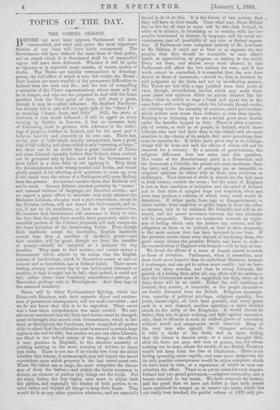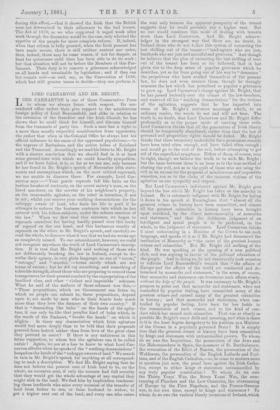TOPICS OF THE DAY.
THE COMING SESSION.
as meaning "fraud, force, and folly." Still, the party of Coercion is very much inflamed ; it will be egged on every evening by Society in London, it has an immense body of distressing facts to produce with reference to the suffer- ings of property-holders in Ireland, and for the most part it believes heartily and sincerely in its own case. There has, on the part of individuals usually unimportant, been a great deal of tall-talking, and abuse which is only "swearing at large ;" but there can be no doubt that a great number of Tories and some Liberals honestly believe that Ireland, when excited, can be governed only by force, and hold the Government to have failed in a clear duty in not applying it. They think the Administration both wrong-headed and feeble, and would gladly punish it for allowing such questions to come up, even if the result were the return of a Parliament still more Radical than the present. An instinct teaches them that Radicals will not be weak. Stormy debates, marked probably by " scenes " and unusual violence of language, are therefore certain ; and we expect a great effort to ascertain very early whether the Moderate Liberals, who play such a part everywhere, except in the Division lobbies, will not desert the Government, and in- sist, if not on its overthrow, at least on its reconstruction. No measure that Government will announce is likely to calm the fury that the past three months have generated, while the remedial portion of the Cabinet proposals will only exasperate the inner irritation of the landowning Tories. Even though Irish landlords accept the inevitable, English landlords cannot bear that a sacrifice of landlord power—and that sacrifice will be great, though we deny the sacrifice of money—should be accepted as a panacea for any troubles. They want to find another, and cannot endure a Government which admits by its action that the English scheme of landlordism, which to themselves seems at once so natural and so beneficent, has in Ireland failed. Their secret feeling, coming out every day in one hot-headed utterance or another, is that it ought not to fail ; that, indeed, it could not fail, unless there were treachery some where,—perhaps at Hawarden, perhaps only in Birmingham. And they rage at the assumed treachery.
There will be bitter Parliamentary fighting, which the Home-rule Members, with their separate object and careless- ness of permanent consequences, will not make less bitter ; and we do not know that this is to be regretted. There never was a time when outspokenness was more needed. We our- selves are convinced that the Irish land-tenure must be changed, must be brought into accord with circumstances, which in Ire- land, as throughout the Continent, have compelled all parties alike to admit that the cultivator must be secured in certain large rights in the soil he tills; but neither we, nor any other Liberals, are blind to the radical nature of the change, to the effects it may produce in England, to the absolute necessity of yielding nothing to the mere aversion of debtors to repay just debts. There is not one of us wholly free from the doubt whether this reform, if mismanaged, may not impair the moral convictions upon which property in the last resort must rest. When the issues are so large, the more outspoken the discus- sion of them the better,—and within the limits necessary to debate, an element of passion only brings out the truth. But we want, before the fray begins, once more to adjure both the parties, and especially the leaders of both parties, to re- solve before and beyond all things to keep their heads. They would do it on any other question whatever, and are especially
bound to do it on this, It is the future of two nations that they will have in their hands. Come what may, Great Britain: has to live for all time to come side by side with Ireland, in unity or in alliance, in friendship or in enmity, with the two peoples intermixed by history, by language, and by social cir- cumstances, past all possibility of any true or distant separa- tion. If Parliament were composed entirely of Mr. Lowthers or Mr. Dillons, it could not so bind or so separate the two peoples that they should be insensible to each other'a insult, or appreciation, or progress, or destiny in the world.. Every act done, and almost every word uttered, in this Parliament will affect the two nations for ever ; and if the. words cannot be controlled, it is essential that the acts done should be those of statesmen,—should be, that is, dictated by cold judgment on the facts, and not by unreflecting passion.. The Tories are hot with a rage justified from their point of view, though, nevertheless, unwise, which may make them press plans and opinions which no nation satiated like the Irish,—that is, unable to wage a frank and equal war in the open field—will ever forgive ; while the Liberals, though cooler.,, are fretting under the necessity of coolness, amid provocations which irritate men worse than defiance, or even than insults. Nothing is so irritating as to see a friend grow more hostile under the benefits heaped on him. There is often a perver- sity of events, as well as of people, in Ireland, which those. Liberals who best feel their duty to the island, and are most sensitive to the charm of its people, find more provoking than even its enemies do. If either party gives way to its feelings,. things will be done and said the effects of which will not be removed for a century. By a miracle of good-fortune, the religious difference does not enter into this question. The leader of the Revolutionary party is a Protestant and his lieutenant a Catholic, the priests are more moderate than the laity, and the planners of outrages are as insensible to religious opinions on either side as their own revolvers or shillelaghs. That element of strife is, almost for the first time in Irish history, outside the arena ; but the mind of England; is just in that condition of irritation, and the mind of Ireland: just in that state of mingled hope and suspicion, when any, error may produce a collision of which every result would be disastrous. If either party, from rage or disappointment, or either nation, from suspicion or pride, begin to treat the othei. as enemies, only to be subdued, Mr. Parnell's end will be at- tained, and the moral severance between the two countries. will be irreparable. There are tendencies towards an explo- sion of feeling which only the leaders can restrain, and the obligation on them to be judicial, at least in their proposals, is the most serious that has been incurred in our time. If the pressure carries them away instead of hardening them, the- great cause, always the greatest Britain can have to seek— the reconciliation of England with Ireland—will be lost at last.
We dread the effects of a sense of despair almost as much as those of irritation. Parliament, when it assembles, may' show itself more hopeful than its individual Members, because it is stronger, and can get to action more readily ; but we have noted for three months, and that in strong Liberals, the growth of a feeling that, after all, any effort will be useless,— that the Government must be supported, but that, when all is done, there will be no result. Either the evil condition of Ireland, they mutter, is incurable, or the people themselves are finally alienated from the British. Religious emancipa- tion, equality of political privilege, religious equality, free. juries, tenant-right, all have been granted, and every grant ends in a new demand, another agitation, a more decided. attack on the unity of the Kingdoms. It would almost be better, they say, to grant nothing, and fight against separation only, than to advance in such an endless groove of concession without result and compromise never observed. Many of the very men who uphold the strongest reforms do it with a shake of the head, and an inner feeling that the labour is thrown away, or a silent thought that, after all, there are men, and men of genius, too, for whom nothing can be done, whom the wealth of the British Treasury would not keep from the fate of Chatterton. There is no feeling spreading more rapidly, and none more dangerous, for its only possible consequences would be either conquest, which we have tried in vain, or a separation of which no man can calculate the effect. There is as yet no cause for such despair.. Ireland had two grand grievances,—religious inequality, and vs tenure unsuited to her wants. We have removed the former, and the proof that we have not failed is that both creeds have combined to compel us to remove the latter, which has not really been touched, the partial reform of 1870 only pro-
clueing this effect,—that it showed the Irish that the British were not determined in their adherence to the bad tenure. The Act of 1870, as we who supported it urged week after week through the discussion would be the case, only whetted the appetite of the people for more complete reform. If, indeed, when that reform is fully granted, when the Irish peasant has been made secure, there is still neither content nor order, then, indeed, there may be some reason, if not for despair, at least for quiescence until time has been able to do its work ; but that situation will not be before the Members of this Par- liament. Their duty is to remove a grievance acknowledged on all hands and terminable by legislation ; and if they can but remain cool—as cool, say, as the Convention of 1688, which had still greater issues to decide—they can perform it.















































 Previous page
Previous page